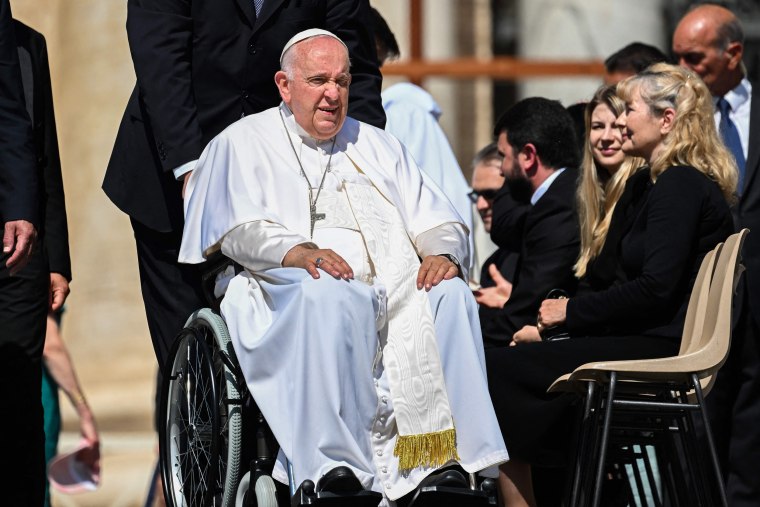ROME — Pope Francis underwent surgery Wednesday to repair a hernia in his abdominal wall, the latest malady to befall the 86-year-old pontiff who had part of his colon removed two years ago.
The Vatican said there were no complications during the three-hour surgery, which required Francis to be under general anesthesia. The pope was expected to remain at Rome’s Gemelli hospital for several days. As a precaution, all papal audiences were canceled through June 18, the Vatican said.
While hernia operations are rarely performed on an emergency basis, the procedure appeared somewhat urgent, scheduled just a day after Francis went to the hospital for tests. The pontiff’s doctors no doubt also wanted to give him ample time for recovery ahead of a busy travel schedule later this summer.
The pope was suffering from a “painful and worsening” hernia that formed over a previous scar, presumably from his 2021 colon surgery. Experts said the formation of the hernia, called a laparocele, is a known complication from intestinal surgery. The concern is that a portion of his intestine may have bulged through the tear and become trapped.

At three hours, the pope’s procedure was considerably longer than the standard 60 to 90 minutes doctors say the operation usually takes.
Spending more time under anesthesia, coupled with being on a ventilator for so long — in someone who has lost part of one lung as a young man — could put the pontiff at risk of breathing complications or a longer-than-expected recovery time.
It was also unclear if doctors removed any more sections of the pope’s colon, which may have been made necessary by the hernia.
Francis went to the hospital for previously unannounced tests Tuesday, returned to the Vatican and presided over his audience Wednesday morning, but then went straight to Gemelli for the procedure afterward.
“When the intestines are trapped, the blood supply to the bowel is compromised. And if you don’t take care of it, the bowel will die, and you will have gangrenous intestines,” said Dr. Walter Longo, chief of colon and rectal surgery at Yale University School of Medicine.
He said Francis should be OK after a few weeks of recovery, but he noted that the aging pope is already frail. “There’s the risk of going through surgery, operating on a fragile individual, but if he can get through it, he will be fine,” he said.
Francis remains in charge of the Vatican and the 1.3-billion strong Catholic Church, even while unconscious and in the hospital, according to canon law.
In July 2021, Francis spent 10 days at Gemelli to remove 33 centimeters (13 inches) of his large intestine. In an interview with The Associated Press in January, Francis said the diverticulosis, or bulges in his intestinal wall, that prompted that surgery had returned.
After that surgery, Francis lamented that he hadn’t responded well to the general anesthetic used in the longer-than-expected procedure. That reaction in part explained his refusal to have surgery to repair strained knee ligaments that have forced him to use a wheelchair and walker for over a year.
Dr. Manish Chand, a professor of surgery at University College London who specializes in colorectal surgery, said the surgery itself is usually straightforward — but it does require general anesthesia. In the procedure, a surgeon typically frees the trapped intestine and then repairs the hernia and implants a prosthetic, most likely a piece of mesh.
He said the greatest issue afterwards would be pain management and making sure the wound heals properly.
“In the first six weeks after this type of surgery, you’re at risk of getting a recurrence again,” he said. To avoid that, patients are advised not to do anything strenuous.
Dr. Robin Phillips, an emeritus professor of colorectal surgery at Imperial College London, pointed out that abdominal surgery can also compromise lung function.
The Argentine pope had part of one lung removed when he was a young man. In late March, Francis spent three days at Gemelli for bronchitis and was treated with intravenous antibiotics. He emerged April 1 saying “Still alive!”
“I suspect they are doing it now because they are worried it might become more complicated and result in an emergency operation, which would carry an even bigger risk than leaving it alone or operating now,” Phillips said.
After celebrating his weekly general audience, the pope was driven in his Fiat 500 out of the Vatican shortly after 11 a.m. and arrived at the Gemelli some 20 minutes later, escorted by police.
“The stay at the health facility will last several days to allow for the normal post-operative course and full functional recovery,” the Vatican said in a statement. An update was not expected until after the procedure.